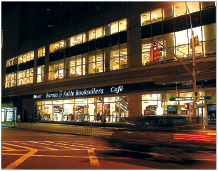
The Barnes & Noble in Lincoln SquareLast month’s announcement that the 60,000-square-foot Barnes & Noble near Lincoln Center will be shutting down is shining a harsh light on the retail landscape for New York City bookstores.
While it’s no shocker that bookstores are struggling, just how bad has the outlook become for them in the city? Are retail brokers expecting more to shutter? And, if they do survive, where will they find a home?
Barnes & Noble has already closed two other stores in the past three years, one in the Chelsea area and one on Astor Place.
And while many mega bookstores are adjusting to the market by launching new products and electronic e-readers, their overall earnings are down.
“Are bookstores dying? Yes, of course, and it has nothing to do with rents in the city,” said Jeff Roseman, executive vice president and a founding partner at Newmark Knight Frank.
Bookstores are following in the path of record stores, he said. “Does anybody under 30 actually buy books or music in a store anymore? Most people order online or read e-books.”
Mary Ellen Keating, a spokesperson for Barnes & Noble, noted in a statement that the Lincoln Center store closed because “the increased rent that would be required to stay in the location makes it economically impossible.” The retailer is, however, looking for another location with a lower rent on the Upper West Side, she said.
And despite the recent closings, the company — which is currently engaged in a very public battle with billionaire investor Ron Burkle, who is trying to take over the ailing book giant — still has a significant presence in the city. It has eight existing Manhattan locations, including the soon-to-shutter Lincoln Square site, and has opened three new superstores in the last five years. In 2005, it opened on Fifth Avenue and 45th Street; in 2007, it opened at 270 Greenwich Street in Tribeca; and in 2009, it opened on 86th Street and Lexington Avenue.
Barnes & Noble’s smaller competitor Borders hasn’t closed any stores in Manhattan in the past few years, said spokesperson Mary Davis. But the company, which also operates Waldenbooks, closed the last Waldenbooks in Manhattan, at 30 Rockefeller Plaza, in 2006. Davis wouldn’t discuss any potential openings or closings of stores in Manhattan.
Ironically, these chains are meeting the same fate as their independent predecessors, which have been shuttering for years — primarily because of the very emergence of book giants like Barnes & Noble in the 1990s.
Indeed, Barnes & Noble famously helped put Shakespeare & Co., on 82nd and Broadway, out of business in 1996. The independent chain still has three stores in Manhattan and one in Brooklyn. In early 2007, Coliseum Books at 57th and Broadway shut down. In 2008, the Strand Bookstore’s Fulton Street annex store closed. And last year, Biography Books on Bleecker Street moved farther down Bleecker — reportedly because of rising rents. It now goes by bookbook, and a Marc Jacobs clothing store took over its old location.
More recently, this past August, East West Living, the self-described “most relaxing bookstore in the city,” closed its doors on Fifth Avenue after 30 years in business.
Faith Hope Consolo, chairman of the retail leasing and sales division at Prudential Douglas Elliman, said, “Bookstores are not a factor in the real estate landscape.”
“You still have some independents, but the large-platform stores are going to consolidate like the banks did,” she said. She added, however, that “they will keep a core presence.”
Brokers estimated that bookstores, depending on their size, typically pay anywhere from $35 to $100 a square foot in rent.
If bookstores do look to expand in more-prime locations, they could do what some big-box retailers have been doing: avoiding expensive ground-floor formats.
“A lot of big boxes are taking basements and second and third floors. Syms, Best Buy, Urban Outfitters and Raymour & Flanigan have all done this,” said Gary Trock, senior vice president, retail, at CB Richard Ellis.
These retail spaces could represent a discount of 70 to 90 percent over the main floor, he said. Basements can be priced as low as the $30-per-square-foot range.
Brokers also noted there is room for a new bookstore in both East and West Harlem, as well as on Wall Street.
Still, even finding more-affordable rents may not be enough, because they are still getting hammered by websites like Amazon and losing ground to e-readers.
“The pricing of New York real estate may hinder them from growing, but [bookstores] are getting hurt anyway,” Trock said.